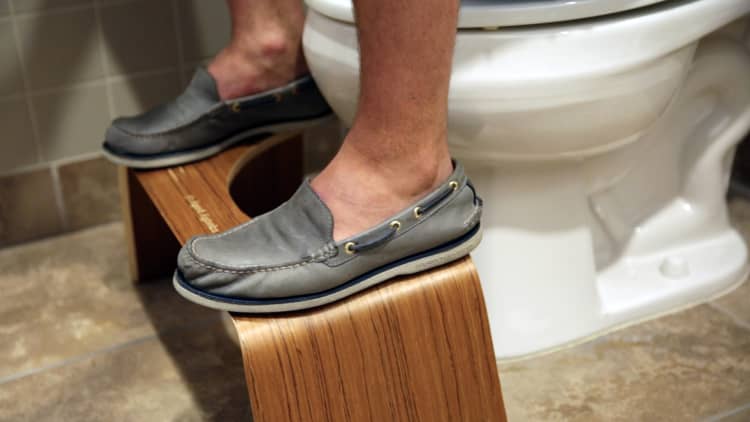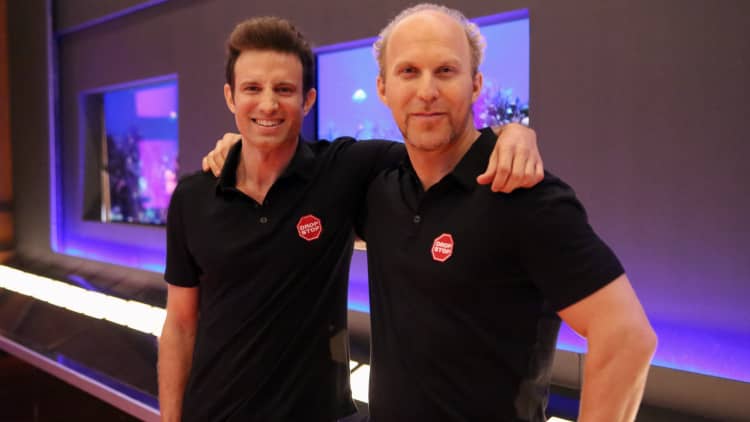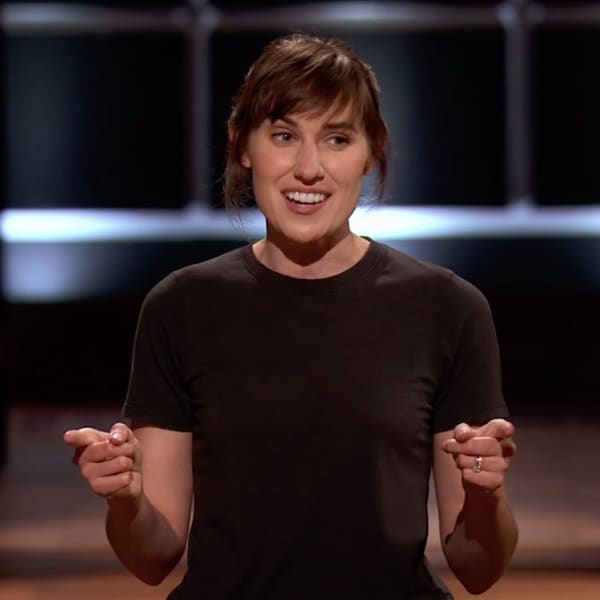Marc Newburger is 42 years old and lives on his best friend's couch in a cramped apartment on the west side of Los Angeles. That friend, 44-year-old Jeffrey Simon, still drives his mom's car.
Together they've sold tens of millions of dollars of a product they invented after Newburger nearly killed himself ... and almost killed someone else.
"I just started screaming, 'WHY DOESN'T SOMEBODY COME UP WITH SOMETHING TO BLOCK THIS STUPID CRACK?'"
That "crack" is the space between a car seat and the center console, the place where you lose phones, keys, pens, lipstick. Newburger and Simon invented a product called Drop Stop to block that crevice, an area they jokingly refer to as The Carmuda Triangle.
You would think someone had already thought of this, that it would be easy to create.
Silly you.
Hollywood Dreams
The strange success of the Drop Stop is an odd turn of events for two men who started out in Hollywood with very different ambitions. Back in the 1990s, before YouTube, a lot of aspiring filmmakers created short videos as a sort of calling card to be distributed on VHS tapes all over town.
Simon helped produce a Hollywood spoof of "Goodfellas" called "Scriptfellas," while Newburger starred in another short called "Livin' With Meshuganah Shiksa."
They were rivals who became friends after recognizing in each other a similar sort of optimistic naivete that's generally absent in Tinseltown. "He's my brother from another mother," said Simon.
After Newburger broke up with a girlfriend in 2006, he crashed on Simon's couch, expecting to be there only for a few months. The two paid the bills by becoming nutrition coaches (this is L.A. after all), and by playing poker before playing poker became a thing. Simon said he would go to the casino every month, "and I would not come home until rent was made."
Shortly after moving in, Newburger was driving down Sunset Boulevard when his phone started vibrating as a call came in. "I was reaching to hit the answer button," he said, but the phone "shimmied" off his center console into that "black hole" between the console and seat.
He instinctively turned to try and stop the phone from falling. "I'm going 40 miles per hour," Newburger said, and as he turned, he unwittingly turned the steering wheel in the same direction. "I looked up, all four tires jumped on the sidewalk, a guy leaped 3 feet out of the way, or I would have killed him, and I just missed the telephone pole by an inch."
Newburger called Simon and told him where he was and what had happened. "I almost killed a human being, almost killed myself hitting a pole."
"I do that all the time," Simon told him.
Newburger replied, "Well, it ends tonight!"
It didn't end that night, but the idea for Drop Stop certainly began then. The two assumed someone had already made a product to block the crevice. "We went to every car wash, we scoured the internet, we scoured the world, and there was nothing!" Newburger exclaimed. Simon said they looked at each other, saying, "If we don't do this, we might get struck by lightning. It was literally a calling for us to do this."
'Inventing for Dummies'
Where to start? They bought "Inventing for Dummies" and began learning about prototyping and patents. They believed they could start the company for $50,000 and be open for business in three months, that soon they'd be rich. "We went to look at beach houses," Newburger laughed.
One Halloween night after the accident, the two bros found themselves without a party invitation for the first time in years. They decided to spend the evening solving the puzzle of The Carmuda Triangle.
"We go down to the car, and we're just sitting there, and we're staring at it for hours," said Newburger (he admits they may not have been completely sober). Earlier, a friend had suggested that any device would need to be able to move back and forth with the seat.
"Then we noticed that the seatbelt catch is attached, it's anchored," said Newburger. "I said if we could figure out something that could attach around that, it would anchor it to the seat; it would move with the seat."
Then they decided to go to Big Lots to buy prototyping supplies, committing to purchase the first 100 items the shopping cart touched. "We're sort of universally guided chaps," Newburger said by way of explanation. The first item the cart touched was a Jane Fonda workout tape, which did not prove to be useful, but among the other 100 items were dress socks and car wash sponges.
They returned to the apartment and spread everything out on the floor, seeking inspiration from a Higher Power. At a certain point that night, they cut up one of the car wash sponges and stuffed it into a dress sock, then cut a notch near one end of the sock to fit the whole thing over the seatbelt anchor.
"We ran down to the car, we put it in," said Newburger. It worked. They were able to stuff the sock into the crevice to fill it up, and by hooking one end around the bottom part of the seatbelt, the device moved with the seat. "It was unbelievable," said Simon.
They debated what to call it. Simon favored "The Gap Goalie," while Newburger wanted to call it "Fuh-gap-aboudit." Simon's mother overheard their conversation and blurted out, "Just call it Drop Stop!"
'Trust us'
Next, the two "inventors" started asking friends and family for money, without telling them what the product was. Simon was terrified someone would steal their idea. "We were saying, 'Please trust us.'"
Eight friends agreed to chip in thousands of dollars and were promised an amazing return: $1 million each, to be repaid at the same rate as the two owners once profits came in.
Newburger's father was astonished. "He said, 'You did what now, son? Do you have any idea what it means to earn a million dollars, much less save a million dollars?'" But the two believed they had something special in Drop Stop. In total, they raised over $750,000.
The company opened for business in 2009. They started selling in swap meets and then tried to join car forums. Simon learned some hard lessons. "You can't just jump onto a forum that you are not a part of. They will destroy you because you are trying to sell a product."
Then these two filmmakers made an infomercial and caught the attention of QVC in time for the holidays. However, their manufacturer sent the shopping network the wrong product, a mistake that nearly bankrupted them.
The lowest point may have been when they had to repay a $350,000 loan from a friend. Newburger and Simon went to the World Series of Poker in Las Vegas to try to win the loan amount but failed. There was only one place left where they could get their hands on that kind of money — the very last of Simon's inheritance.
"We still didn't have a patent. Now I'm going to have to take out another $350,000 with a huge penalty," said Simon. They were most concerned about patenting the notch, which connects the Drop Stop to the seat belt bottom. "We can't even protect our product. We're getting knocked off, counterfeit, everything was happening left and right."
He went inside the bank to make the final withdrawal with a heavy heart. Newburger was waiting outside in the car when suddenly he got an email from their lawyer. The patent had been approved. Newburger turned on the video recorder of his phone and walked into the bank.
"You know what today is?" he asked his business partner and best friend. Simon looked up at the phone, irritated and sad. "Our patent just got approved," Newburger told him. Simon was incredulous, then joyous as they hugged.
The 'Shark Tank' effect
Soon, they were selling the right products on QVC (though Volvo stopped letting them rent one of its cars to use on TV as a demo, presumably because the Drop Stop demonstrated a safety gap). Drop Stop then got a big break when it was featured on "Shark Tank" in 2013, and investor Lori Greiner became a 20 percent owner in exchange for funding and expertise. She helped get the product into more stores.
More than 10 years after Newburger jumped the curb on Sunset Boulevard, he and his business partner have sold 2.4 million Drop Stops with revenues totaling $24 million. The two men are now reaching out to insurers and cellphone companies, hoping these businesses will buy the product to give away to loyal customers for free.
"People are dying every day because of this gap," said Newburger.
The natural question is why something like the Drop Stop isn't standard in all cars. "If General Motors is listening, or Ford, give us a call!" said Simon. "This is a preventable problem."
Life after the couch
So why is Newburger still living on Simon's couch? The company nets about $2 per sale, which would add up to around $4.6 million. "We're traveling all the time, I get plenty of beds when I travel," said Newburger. "We're just so blessed to have a roof over our heads."
But aren't they millionaires? He points out that Greiner receives 20 percent of income, and they're still paying off the eight original investors $1 million apiece.
But the truth is, they like the way they live. "When I meet girls, we're very honest about our life," said Newburger. "They hear and see what's going on, and they think, 'Oh, they must have some Malibu mansion somewhere."
Simon agreed, adding: "They go, 'We want to go on your yacht.' I go, 'Our yacht is this couch.'"
Disclosure: CNBC owns the exclusive off-network cable rights to "Shark Tank."
Like this story? Like CNBC Make It on Facebook.
Don't Miss: How this entrepreneur went from a crack addict to a self-made multimillionaire







